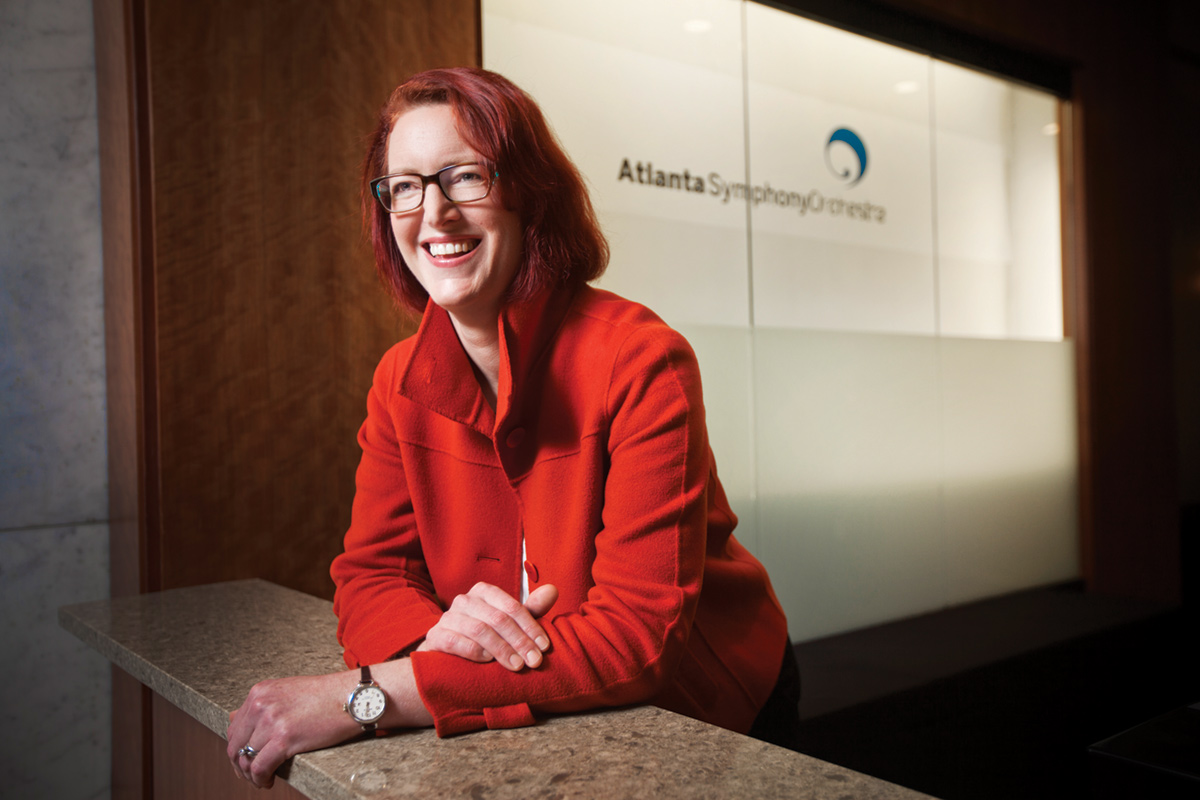Executive Decision
Georgia native, music alumna takes charge at Atlanta Symphony Orchestra

Jennifer Barlament admits it. She is a big music nerd.
As an Emory Scholar in the early 1990s, the music and physics major spent nearly every weekend attending Atlanta Symphony Orchestra performances on student tickets.
“I’d go with my friends, and we’d talk about the performances on the way home on the shuttle or I’d just go by myself,” says Barlament 95C, who joined the Atlanta Symphony Orchestra (ASO) as executive director in January. “I especially remember a concert with Yoel Levi and guest Romanian pianist Radu Lupu. I was just blown away by the artistry. It was a memorably transcendent moment among many experiences I had. At Emory, my head was in other things, but my heart was in music.”
At the encouragement of her music teachers, Barlament decided to focus on clarinet performance as a career and she went on to graduate school at the Eastman School of Music at the University of Rochester. It was her experience there that changed her course. Seeing a need for a large orchestra that would help prepare graduate performance students for rigorous professional auditions, she founded the student-run New Eastman Symphony to help provide practical experience, building graduate students’ confidence and their repertoires.
“I became more and more fascinated by the process and the things that have to be done to make a concert happen—organizing communications, the venue, the equipment. It was a student ensemble, but we dealt with the same issues a professional orchestra would deal with,” Barlament says.
She came to realize that her talents for organization could complement her love of music in the field of orchestra management.
“When I played clarinet, I was one of a hundred voices in the orchestra. It is incredibly thrilling to sit on stage in the midst of an orchestra playing, and I loved it, but I loved the art form as well and I wanted it to continue and thrive,” she says.
After earning her master’s degree in clarinet performance, Barlament was awarded a highly competitive fellowship in orchestra management by the League of American Orchestras. The yearlong fellowship served as a practicum for Barlament, who spent three and a half months each with three professional orchestras—the San Franciso Symphony, the New Jersey Symphony, and the Detroit Symphony—to learn the business of orchestra leadership.
While with the San Francisco Symphony under executive director Peter Pastreich, she was on the support team for the group’s 1998 contract negotiations.
Barlament joined the Detroit Symphony as director of special projects before becoming concert manager for the Baltimore Symphony. After Baltimore, she served as executive director of the Kalamazoo Symphony Orchestra and general manager of the Omaha Symphony before becoming general manager of the Cleveland Orchestra, one of the original “Big Five” American symphonies.
“I’ve worked with seven different orchestras, with budgets ranging from $2.7 million to $70 million. It has been a tremendous opportunity to see these different orchestras in the context of their communities,” she says.
Barlament inherits an ASO that is on the upswing from several years of financial trouble and fractious negotiations with ASO musicians that led to two lockouts in two years—including a nine-week 2014 lockout that delayed the beginning of the ASO’s seventieth anniversary season. The most contentious point pitted the organization’s finances against the orchestra’s size. The 2014 negotiations, overseen by federal mediators, helped forge a four-year pact between ASO management and musicians that trimmed the orchestra’s ranks to seventy-seven full-time players.
Before a resolution was reached, the nationally publicized fracas led to the resignation of ASO president and CEO Stanley Romanstein. Retired Coca-Cola executive and ASO board member Terry Neal assumed an interim role until Barlament came on board.
Barlament said the thought of taking on leadership of an organization that is recovering financially and in terms of morale was “daunting from the outside.”
“The thing that really impressed me and made me excited about coming here is that, after all the labor disputes were settled, the community responded with incredible generosity,” she says. “The basis on which creative vitality is built is fiscal sustainability. If we are able to achieve fiscal sustainability, we will have more and more creative vitality.”
The ASO finished its 2014–2015 season with an operational surplus after eleven years of deficits, and $13.3 million was raised for its Musicians’ Endowment Campaign, surpassing the midway point of the $25 million goal in less than a year.
“The lifeblood of the orchestra, its heart and soul, is the music and the musicians. Making sure the musicians feel how important they are to the institution and making sure everyone understands the centrality of music-making to what we do is key,” Barlament says. “Atlanta is a great city, and it deserves a great orchestra. ”
She is dedicated to bringing the symphony to the community through the ASO’s educational programs, family concerts, and youth concerts, as well as its regular programming.
“Atlanta is a diverse city and culture. I want to make sure we are here for every single member of the community,” she says. “Everyone in Atlanta should come and hear the orchestra because the orchestra is for everyone. Helping people take a moment out of their busy lives to listen to something beautiful is a great antidote for the insanity of modern life.”—Maria M. Lameiras



